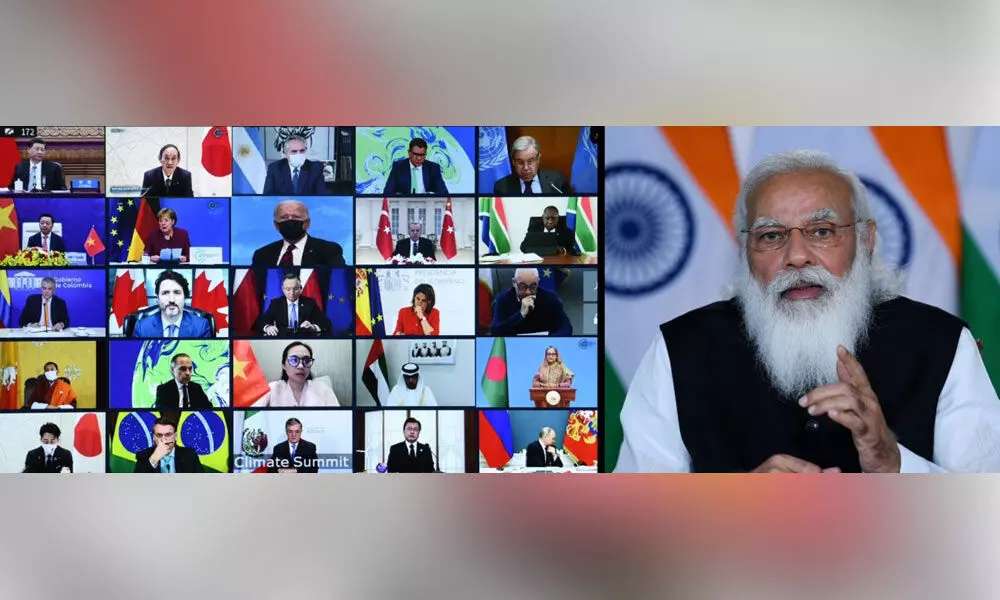PM Modi announces launch of India-US clean energy partnership
To help mobilise investments, demonstrate clean technologies and enable green collaborations
image for illustrative purpose

New Delhi: Prime Minister Narendra Modi announced on Thursday that India and the US are launching an "agenda 2030" partnership on green collaborations as he pitched for concrete action at a "high speed" and on a "large scale" globally to combat climate change.
Addressing a virtual summit on climate change convened by US President Joe Biden, Modi said a guiding philosophy of "back to basics" must be an important pillar of the economic strategy for the post-Covid era and asserted that India has taken "many bold steps" on clean energy, energy efficiency and bio-diversity, despite its development challenges. The summit is being attended by some 40 world leaders, including Chinese President Xi Jinping, his Russian counterpart Vladimir Putin, Canadian Prime Minister Justin Trudeau and his Japanese counterpart Yoshihide Suga. "As a climate-responsible developing country, India welcomes partners to create templates of sustainable development in the country. These can also help other developing countries, who need affordable access to green finance and clean technologies.
"That is why, President Biden and I are launching the 'India-US Climate and Clean Energy Agenda 2030 Partnership'. Together, we will help mobilise investments, demonstrate clean technologies and enable green collaborations," Modi said. In his remarks on the opening day of the two-day summit, the prime minister also recalled the words of Swami Vivekananda, saying he called on "us to 'arise, awake and stop not until the goal is reached'".
On the Indo-US partnership, a joint statement by the two sides said it is aimed at demonstrating how the world can "align swift climate action" with inclusive and resilient economic development, considering national circumstances and sustainable development priorities".
"Led by Prime Minister Modi and President Biden, the partnership will represent one of the core venues for India-US collaboration and focus on driving urgent progress in this critical decade for climate action," it said. "The partnership will aim to mobilise finance and speed clean energy deployment; demonstrate and scale innovative clean technologies needed to decarbonise sectors including industry, transportation, power and buildings; and build capacity to measure, manage and adapt to the risks of climate-related impacts," it added.
"Both India and the US have set ambitious 2030 targets for climate action and clean energy. In its new nationally determined contribution, the US has set an economy-wide target of reducing its net greenhouse gas emissions by 50-52 per cent below 2005 levels in 2030," the joint statement said. In his address at the summit, Modi said India's per capita carbon footprint is 60 per cent lower than the global average.
"For humanity to combat climate change, concrete action is needed. We need such action at a high speed, on a large scale and with a global scope," he said. "We, in India, are doing our part. Our ambitious renewable energy target of 450 Gigawatts by 2030 shows our commitment," the prime minister added. He said humanity is battling a global pandemic right now and the climate summit is a timely reminder that the grave threat of climate change has not disappeared. "In fact, climate change is a lived reality for millions around the world.
Their lives and livelihoods are already facing its adverse consequences," Modi said. He said India is among the few countries whose "NDCs are two-degree-Celsius compatible". Under the Paris agreement, each country has to set its own emission-reduction targets, known as national determined contributions (NDCs) and the pact's goal is to limit global warming to well below two degrees Celsius.
"Today, as we discuss global climate action, I want to leave one thought with you. India's per capita carbon footprint is 60 per cent lower than the global average. It is because our lifestyle is still rooted in sustainable traditional practices," Modi said. He also emphasised the importance of a lifestyle change in climate action. "Sustainable lifestyles and a guiding philosophy of 'back to basics' must be an important pillar of our economic strategy for the post-Covid era," Modi said. He also mentioned that India is encouraging global initiatives such as the International Solar Alliance, the LeadIT and the Coalition for Disaster Resilient Infrastructure.
The summit is being hosted by Biden, for whom climate change has been an area of focus. After taking charge as the president, Biden on January 20 announced the return of the United States to the Paris climate accord. The virtual summit is part of a series of global meetings focussing on climate issues, being held in the run up to the UN Climate Change Conference (COP26) in November. Earlier this month, US Special Presidential Envoy for Climate John Kerry visited India and discussed issues relating to climate, including the virtual summit, with Indian leaders. The Indian leaders conveyed to him about the country's efforts to meet the commitments under the Paris climate agreement and reduce emissions.

